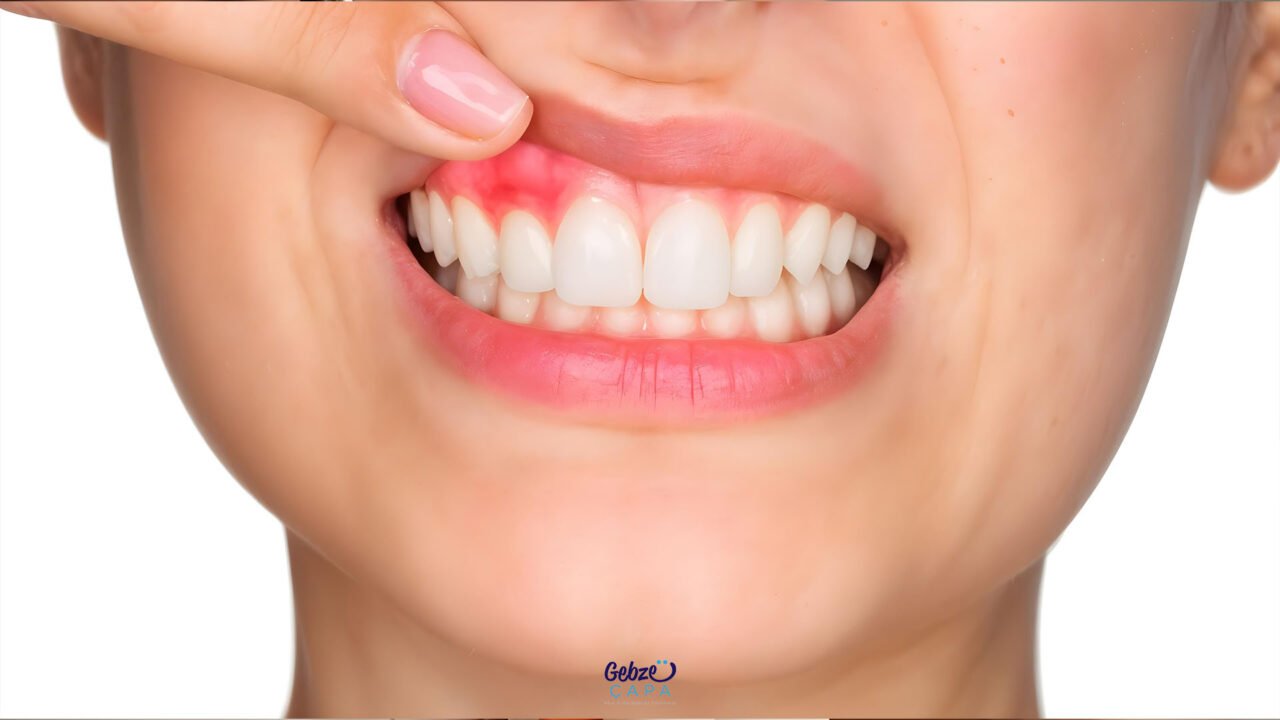Gum Abscess
It is a type of infection that occurs as a result of inflammation in the gums and can often cause severe pain. Generally, gingivitis, which is a milder condition at first, can progress over time and turn into a more serious infection. This process manifests itself with symptoms such as inflammation accumulation in the gums, swelling, pain and sometimes bleeding in the gums. If not treated on time, it can lead to the spread of infection and more serious health problems.
Neglecting oral hygiene can lead to the development of gum disease, which can have negative effects on both your dental health and your overall health. If a gum abscess is left untreated, there may be a risk of tooth loss, bone damage and larger infections. Therefore, maintaining gum health is possible with regular dentist visits and proper oral care. Recognizing the symptoms of gum abscess early and starting treatment is critical to maintaining a healthy oral structure.
Causes of Gum Abscess
The most common cause of gum abscess is that when adequate oral hygiene is not maintained, food residues and plaque accumulate in the gums, creating a suitable environment for the growth of bacteria. These plaques pave the way for the development of bacterial infections over time. Inflammation of the gums (gingivitis) occurs and if left untreated, this condition can progress to a more serious infection, namely gum abscess. Other important causes include tooth decay. Cavities in the teeth can cause bacteria to spread to the gums, which leads to infections in the gum tissue.
Dental tartar and plaque also play an important role in the formation of gum abscess. Tartar accumulated in the mouth encourages the proliferation of bacteria, and these bacteria can damage the gums and cause abscesses. Additionally, in individuals with weak immune systems, such as those with chronic diseases such as diabetes, bacterial infections can spread more easily and the risk of gum abscess increases. Since the spread of infections is faster in people with weak immune systems, gum diseases may progress faster in these people. Smoking is also a factor that causes gum abscess. Increased bacteria in the mouth and susceptibility to gum disease are more common in smokers.
Smoking accelerates the growth of bad bacteria in the mouth, causing gums to weaken. Finally, not brushing your teeth properly, not using dental floss, or brushing with the wrong technique can also cause bacteria to accumulate in the gums. Inadequate tooth brushing habits cause the gums to not be cleaned and become inflamed over time. All these factors can lead to the development of gum abscess and seriously threaten oral health.

Symptoms of Gum Abscess
This condition usually develops suddenly and may manifest itself with severe pain. I have highlighted the common symptoms below;
- Pain and Swelling: Pain that begins in the gums may increase in severity as it progresses. Swelling and tenderness may also be observed in the area where the abscess is located.
- Bleeding: Gums normally do not bleed when they are healthy. However, a gum abscess can cause the gums to bleed easily.
- Bad Breath: Infection in the area where the abscess is located can cause bad breath. This is a symptom of bacterial infection.
- Mobile Teeth: As the abscess progresses, movement of the teeth may occur. Displacement of teeth is a symptom that your gums are infected.
- Bitter Sensation and Inflamed Tissue in the Mouth: When the gums become inflamed, pain and redness may be observed in the area. Additionally, inflammation and swelling occur in the tissues due to the effect of the infection.
- Fever: If the abscess spreads throughout the body, fever may occur. This is an indication that the infection is progressing.
How to Treat Gum Abscess?
Treatment of gum abscess aims to prevent the spread of infection and reduce pain. Treatment usually begins with antibiotics; Dentists administer antibiotic therapy to prevent the spread of infection and relieve inflammation. However, antibiotics should only be used when recommended by a dentist. Painkillers can also be used to relieve the pain caused by an abscess, but these medications only provide temporary relief.
The dentist may intervene to clean the infected area, preventing the spread of bacteria. In addition, tartar cleaning is done because tartar and plaque can cause bacteria to multiply. It is also very important to pay attention to good oral hygiene and use regular tooth brushing and flossing during the treatment process. If the infection spreads and the condition becomes serious, surgical intervention may be required; In this case, some of the gums can be removed or the abscess can be drained.

How Can We Prevent Gum Abscess?
The best way to protect yourself from gum abscess is to keep your oral hygiene at the highest level. I have mentioned some precautions you can take below…
- Regular Teeth Brushing: By brushing your teeth at least twice a day, you can prevent the accumulation of bacteria in the gums.
- Flossing: Using dental floss cleans the plaque between the teeth and prevents the growth of bacteria.
- Dentist Check-ups: By visiting your dentist at least twice a year, you can detect possible gum problems at an early stage.
- Healthy Nutrition: Your oral health is directly related to your nutrition. You can protect your teeth by avoiding sugary foods and acidic drinks.
- Not Smoking: Smoking is a habit that negatively affects oral health. Quitting smoking reduces the risk of gum disease.


